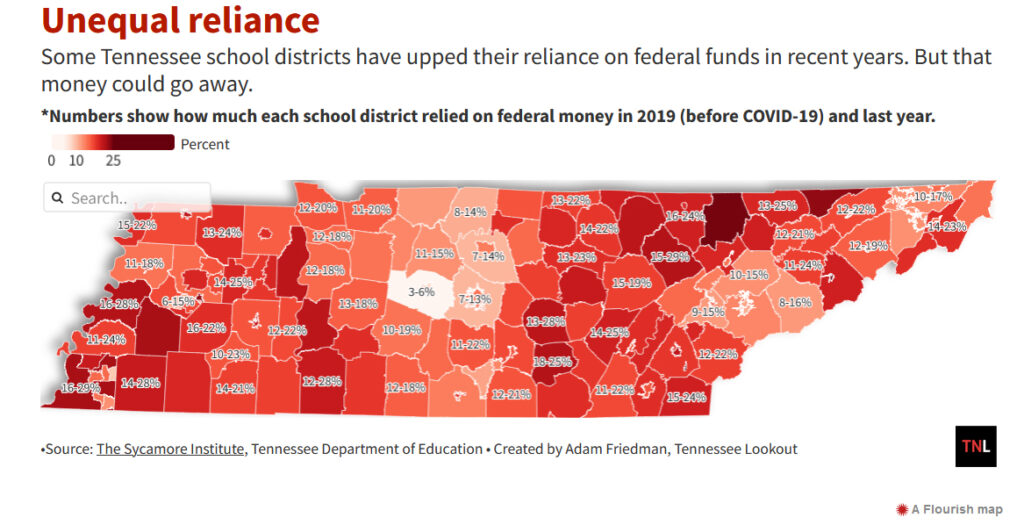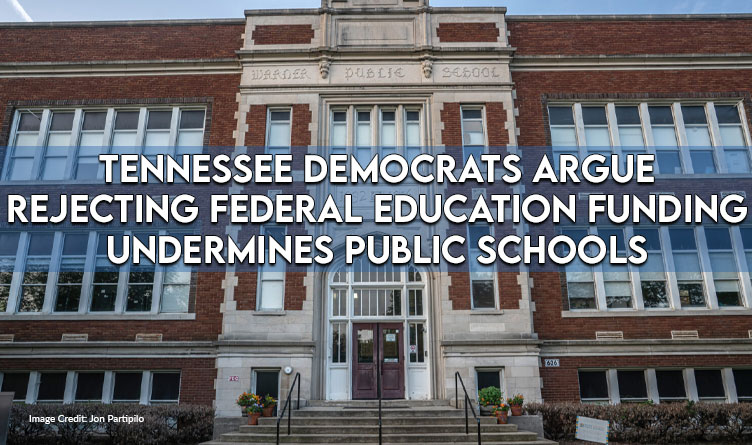Image Credit: Jon Partipilo
By Sam Stockard [Tennessee Lookout -CC BY-NC-ND 4.0] –
Critics of a plan to consider rejecting upwards of $1.9 billion in federal education funds say the idea would undermine public schools in favor of private and charter school operators.
One lawmaker, Sen. Heidi Campbell, went as far as to call it “a grift.”

“The controlling party has made it pretty damn clear that they’re not interested in having to follow any of the rules that go along with federal dollars,” the Nashville Democrat said Tuesday. “And one thing that would not make it difficult to do for them is to privatize our entire public education system, which is what TISA (Tennessee Investment in Student Achievement) was about and which is the ultimate goal.”
Campbell, a former Metro Nashville mayoral and congressional candidate, further contends Republican lawmakers want to transfer public money to private organizations such as Hillsdale College and other charter schools.
American Classical Education schools received approval in Rutherford County Schools this year after a change in the local board’s makeup and are appealing negative votes in Maury and Madison counties to the Tennessee Charter School Commission, which has final authority under a law passed early in Lee’s first term.
“They do not believe government should be in the business of education, and they’ve been advocating for that for years, and in lieu of doing that they just want to make sure … that their friends and buddies are profiting off our education dollars,” Campbell added.
House Speaker Cameron Sexton, a potential 2026 gubernatorial candidate, and Lt. Gov. Randy McNally announced the creation of a committee this week to study federal requirements on K-12 education and the possibility of rejecting federal funds. Tennessee received $1.89 billion in federal funds for schools last year, but that money could shrink slightly once money tied to COVID-19 relief funds for schools dries up.

Neither one would say what types of federal mandates or restrictions they oppose, nor did they respond to questions about the state’s budget situation. They made the proposal a week after the state’s budget revenues came in below projections following two years of roughly $2 billion in surpluses.
McNally said education-related bills often come with financial analyses showing the legislation could risk a federal funding loss and the study group should decide if any requirements are “harmful.”
Asked whether the plan is a nod to private and charter schools, which technically are part of local districts but are formed by private entities and receive public funds, McNally spokesman Adam Kleinheider pointed out the “working group” is designed to “study, analyze and inform,” and he noted McNally has no “predetermined outcome” for the committee.
Tennesseans for Student Success, a charter school lobbyist, barely took a stand. It generally supports increased funding for all public-school students and will evaluate proposals, said spokesman Sky Arnold.

House Republican Caucus Chairman Jeremy Faison said he “wholeheartedly” backs the idea of Tennessee gaining autonomy from the U.S. Department of Education.
“They lack the knowledge of who our Tennessee children are and their needs. If there is a way for us to sever the input of D.C. bureaucrats from our classrooms and still be able to fully fund TISA, then I’m all for it,” Faison said, referring to the state’s new K-12 funding formula, which is based largely on student needs rather than school district size.
Opponents of the funding formula, which passed in 2022, say it is designed to attach a dollar figure to students so a certain amount of state funding will follow them if they enter the education savings account program, which provides tax dollars for enrollment in private schools.
Faison did not respond to questions about the financial impact of losing federal education money, which goes to Title I programs for low-income students, nutrition and children who need special education.

But Democratic state Rep. G.A. Hardaway was livid over the possibility of dropping federal education funding and said it could create a $2 billion “hole” in the budget.
Tennessee draws about $18.8 billion of its $56.2 billion budget from the federal government, and of the $1.89 billion the state receives for education, school districts net an average of $7.9 million annually, with more than $192 million going to Shelby County Schools and a low of $311,000 going to Richard City Special School District in Marion County, which is made up of one school, according to 2019 figures from the Sycamore Institute.
Besides saying the idea is designed to boost private and charter schools, Hardaway said, “I think it’s a greater danger than we know.”
Giving the Legislature all decisions over education funds and how the money is spent could have far-reaching implications, he said, especially considering the assembly’s actions that have brought constitutional and statutory challenges the last few years. He’s also worried that low-income students and special needs children would suffer without “direct oversight” from the federal government.
*Note: This article was edited for length and style by The Tennessee Conservative per The Tennessee Lookout’s republishing guidelines.


About the Author: Sam Stockard is a veteran Tennessee reporter and editor, having written for the Daily News Journal in Murfreesboro, where he served as lead editor when the paper won an award for being the state’s best Sunday newspaper two years in a row. He has led the Capitol Hill bureau for The Daily Memphian. His awards include Best Single Editorial from the Tennessee Press Association. Follow Stockard on Twitter @StockardSam



4 Responses
Of course, the liberals don’t want to stop the money from the government. It would allow our children to be taught English, Math, and true History. Stop all of the absurd testing that teachers have to do daily, stop all of the illegal aliens from entering our schools, stop the control of the administration from thinking they can have our children.
Anything the government has money in is corrupt.
Amen, Pat. In fact, to my way of thinking, advantages to Charter Schools would be a good thing. With more emphasis on teaching basics which is what our schools are supposed to be doing, sapping the power of the Union and those legislators who profit off Federal money would be an excellent move.
So! Competition is good .
I guess the public schools operate on the participation diploma program.
“…school districts net an average of $7.9 million annually, with more than $192 million going to Shelby County Schools…”
Same logic as the “gun deaths” for children. Memphis leads in federal funds consumption and education spending for decades, while being a perrenial failure academically. Trying to lump them in with the rest of the state districts to find an average loss of funding is disingenuous.